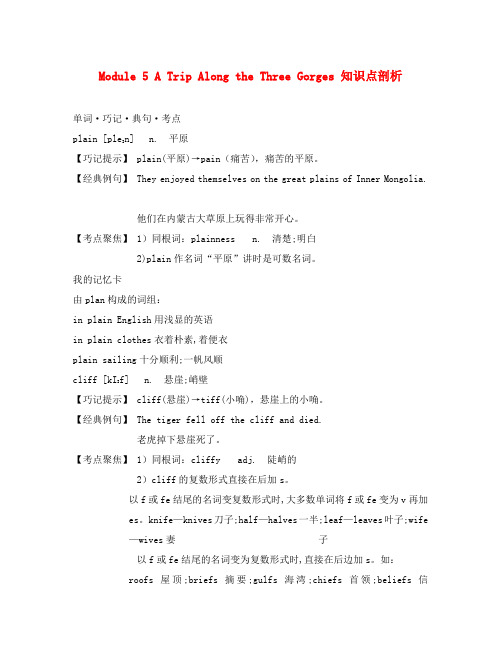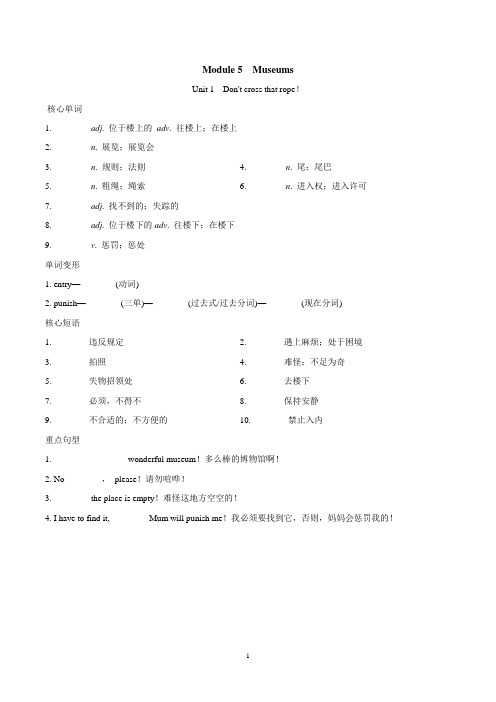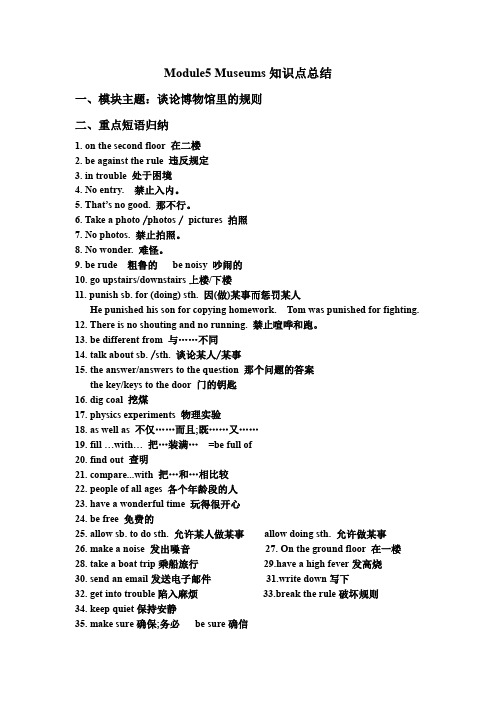module5 unit3过去分词
高中英语必修4Module 5 A Trip Along the Three Gorges 知识点剖析

Module 5 A Trip Along the Three Gorges 知识点剖析单词·巧记·典句·考点n] n.平原plain [pleI【巧记提示】 plain(平原)→pain(痛苦),痛苦的平原。
【经典例句】 They enjoyed themselves on the great plains of Inner Mongolia.他们在内蒙古大草原上玩得非常开心。
【考点聚焦】 1)同根词:plainness n.清楚;明白2)plain作名词“平原”讲时是可数名词。
我的记忆卡由plan构成的词组:in plain English用浅显的英语in plain clothes衣着朴素,着便衣plain sailing十分顺利;一帆风顺cliff [kIf] n.悬崖;峭壁I【巧记提示】 cliff(悬崖)→tiff(小唃),悬崖上的小唃。
【经典例句】 The tiger fell off the cliff and died.老虎掉下悬崖死了。
【考点聚焦】 1)同根词:cliffy adj.陡峭的2)cliff的复数形式直接在后加s。
以f或fe结尾的名词变复数形式时,大多数单词将f或fe变为v再加es。
knife—knives刀子;half—halves一半;leaf—leaves叶子;wife—wives妻子以f或fe结尾的名词变为复数形式时,直接在后边加s。
如:roofs屋顶;briefs摘要;gulfs海湾;chiefs首领;beliefs信仰;proofs证据;safes保险箱注意:handkerchief(手绢)的复数两种形式都可以。
shore [] n.岸【巧记提示】 shore(岸)→short(短的),短小的河岸。
【经典例句】 The ship was hugging the shore.靠岸航行。
【考点聚焦】请注意shore,bank,coast,seaside和beach的区别:shore指与海洋、江河水面相接的陆地,即“海岸、湖岸”,强调陆地与水面的衔接,一般前面不加限定词,但the shores of the lake已经有限定关系,所以可以加the,shores可用复数,有时on shore可以表示“在岸上、在陆地上”,与on land有相同的意思,相对于on the sea。
外研社小学英语三四五年级(三年级起点)单词表(带音标)

三年级上册单词表MOUDLE 1I 我am 是hello(hi)你好goodbye(bye-bye)再见how 怎样are 是you 你good 好的morning 早上fine 很好thank 谢谢MODULE 2Ms 女士too 也and 那么、和boy 男孩girl 女孩what 什么is 是your 你的name 名字afternoon 下午Mr 先生MODULE 3the 这个,那个,这些,那些door 门please 请window 窗户blackboard 黑板bird 鸟desk 桌子chair 鸟MODULE4my 我的it 它red 红a(an)一个,一panda 熊猫blue 蓝yellow 黄green 绿black 黑dog 狗cat 猫cap 帽子MODULE 5many 许多how many 有多少one 一two 二three 三four 四five 五six 六seven 七eight 八nine 九ten 十eleven 十一twelve 十二hat 帽子MODULE6this 这个school 学校pupil 小学生classroom 教室English 英语teacher 教师that 那个bag 书包pencil 铅笔pen 钢笔book 书MODULE 7happy 快乐Birthday 生日here 这里,这是cake 蛋糕old 年岁how old 多大loot 看MODULE 8no 不not 不,不是yes 是的help 帮助kite 风筝where 哪里,在哪里in 在什么里面bag 袋子MODULE 9mother 母亲father 父亲doctor 医生grandpa 祖父,外祖父grandma 祖母,外祖母sister 姐妹me 我(宾格)brother 兄弟driver 司机policeman 警察farmer 农民nurse 护士he 他she 她MODULE 10body 身体his 他的head 头arm 手臂leg 腿foot 脚her 她的eye 眼睛ear 耳朵mouth 嘴nose 鼻子三年级下册单词表MODULE1favourite 特别喜欢的song 歌曲toy 玩具ship 轮船car 小汽车doll 洋娃娃MODULE2they 他们tiger 老虎big 大的lion 狮子elephant 大象monkey 猴子small小的fat 胖的short 矮的tall 高的thin 瘦的tree 树MODULE 3like 喜欢football 足球basketball 篮球table tennis 乒乓球swimming 游泳skipping rope 跳绳MODULE 4pass 传,递rice 米饭Mum 妈妈meat 肉noodles 面条fish 鱼milk 牛奶banana 香蕉apple 苹果pear 梨orange 橘子MODULE 5get up 起床at 在...o’clock 点钟go to school 上学have lunch 吃午饭go home 回家watch TV 看电视go to bed 上床睡觉half 一半past 超过have breakfast 吃早饭have dinner 吃晚饭MODULE 6do 做weekend 周末Chinese 语文,汉语Maths 数学Science 科学play 打(球)sleep 睡觉today 今天Music 音乐Art 美术PE 体育MODULE 7for 给,为about 关于Spring 春节New Year新年Christmas圣诞节England 英国sing 唱歌give 给present 礼物eat 吃MODULE 8hot 热的summer 夏天spring 春天warm 暖和的fly 放(风筝)autumn 秋天cool 凉爽的winter 冬天cold 寒冷的sunny 晴朗的,阳光充足的windy 有风的MODULE 9have got 拥有animal 动物sport运动dress 连衣裙,女装coat 外套sweater 毛线衫has got 拥有(have got的第三人称单数形式)T-shirt T恤衫by 乘坐,以……方式bike 自行车bus 公共汽车go to work 上班walk 步行MODULE 10on 在……上面box 盒子under 在……下面bedroom 卧室park 公园swim 游泳lake 湖snow 雪四年级上册单词表Module 1straight [streit]直地,直线地go straight on 直着走left [left]左边;向左;左边的right [rait]右边;向右;右边的lost [lɔst]迷路的live[liv] 居住No.(number的缩写)第……号street[strit] 大街,街道excuse [iks'kju:z]原谅excuse me对不起,打扰turn [tə:n]转动,旋转turn left 向左转turn right 向右转next to(['nekst])临近的,在…旁边supermarket['sju:pə,mɑ:kit] 超市beside[biˈsaid]在……旁边,在……附近cinema[ˈsinəmə]电影院so much[səʊmʌtʃ]十分,非常You`re welcome!不客气!station['steiʃən] 车站train[trein] 火车hill[hil] 小山near[niə] 接近,临近house[haus] 房屋Module 2read[ri:d] 阅读running [ˈrʌniŋ] 跑步these [ði:z]这些picture['piktʃə] 图画take[teik]拍摄take pictures['piktʃəz]照相children ['tʃildrən] (child的复数) 孩子们listen ['lisn]听listen to听talk[tɔ:k]说话,交谈talk to 和……交谈China['tʃainə] 中国Module 3kid[kid]小孩get on 上(车)can[kæn] 能够see[si:]看到lots of许多interesting['intristiŋ] 有趣的thing[θiŋ] 物品,东西people['pi:pl] 人,人们row[rəu] 划(船)dragon['dræɡən]龙boat[bəut] 船dragon boat龙舟men[men](man的复数)男人;between[biˈtwi:n]在……之间,在中间chess[tʃes] 国际象棋play chess下国际象棋drink[driŋk] 喝,饮用soya milk[ˈsɔiəmilk]豆浆clock[klɔk]钟hungry['hʌŋgri] 饥饿的Me too我也一样draw[drɔ:] 画jump[dʒʌmp] 跳sing[siŋ]唱歌dance[dɑ:ns]跳舞Module 4want[wɔnt] 需要,想要some[sʌm] 一些juice[dʒu:s]果汁ice [ais]冰,冰块also['ɔ:lsəʊ]也,还food[fu:d]食物fast food 快餐make[meik] 制作tomato [təˈmɑ:təu]番茄,西红柿egg [eɡ]鸡蛋potato[pəˈteitəʊ]马铃薯,土豆how much…?......多少钱?flower ['flaʊə(r)]花dumpling [ˈdʌmpliŋ]水饺help[help]帮助,帮忙buy[bai]买Module 5run[rʌn] 跑fast[fɑ:st] 快sky [skai]天,天空high[hai] 高winner['winə] 冠军far[fɑ:] 远afraid[əˈfreid]恐怕strong[strɔŋ]健壮的star[stɑ:(r)]明星Module 6sweets[swits](常复)糖果soup[su:p]汤sorry['sɔri]抱歉,对不起bread[bred]面包dark[dɑːk]黒暗的well[wel](语气词)唔,噢turn on [tə:n ɔn]打开light[lait]灯Halloween[ˌhæləʊˈi:n]万圣节前夕trick or treat[trik ɔ: tri:t]不请吃就捣蛋give [ɡiv]给come in[kʌm in]请进of course [ɔv kɔ:s]当然Module 7there is [ðɛəiz]有,存在horse[hɔ:s]马there are[ðɛəɑ:] 有,存在have a look[hæv əluk]看一看sheep[ʃip] 羊,绵羊vegetable['vedʒitəbl] 蔬菜climb[klaim]爬,攀爬face[feis]脸,面孔fruit[fru:t] 水果chicken['tʃikin]鸡bear[beə(r)]熊pig[piɡ]猪Module 8visit['vizit]参观,拜访tomorrow[tə'mɔ:rəu] 明天plane [plen] 飞机get up [ɡet ʌp] 起床o'clock [ə'klɔk]……点钟from[frɔm] 来自……sea[si:] 大海swimsuit[swimsu:t] 游泳衣sock [sɔk]短袜fish [fiʃ] 鱼,钓鱼,捕鱼hooray [hu'rei](表示激动与高兴的呼喊声)好,好哇Module 9sports day [spɔːt s de i]运动日win[w i n]胜利,取胜month[mʌnθ]月hundred['hʌndrəd]一百(100)metre['mi:tə]米every['evri] 每个,每一day一天,一日luck[lʌk]运气good luck祝你好运come on['kʌmɑ:n ɔ:n] 快点,赶快jump [dʒʌmp]跳high jump [ha i dʒʌmp]跳高long jump [lɔːŋ dʒʌmp]跳远how about…?[haʊə'baʊt]......怎么样?subject['sʌbdʒi kt]学科,科目Module 10family['fæməli家,家庭dinner['dinər]晚餐,正餐year[jiə(r)]年份New Year新年Chinese[tʃai'niːz]中国的festival['festivl]节日the spring festival春节I see我明白了peanut['piːnʌt]花生merry['meri]愉快的Christmas['krisməs]圣诞节Merry Christmas!圣诞快乐!四年级下册单词表Module 1nice[na i s]好的,友善的clever['klevə(r)]聪明的naughty[ˈnɔti]淘气的shy[ʃa i]害羞的*answer['ɑ:nsə(r)]回答,答案*call[kɔ:l]打电话,大声喊*bad[bæd]坏的cool [ku:l]酷的*aunt[ɑ:nt]阿姨*uncle['ʌŋkl]叔叔*big[biɡ]大little['l i tl]小的,年幼的cute[kju:t]可爱的a bit[ə bit] 有一点Module 2city[ˈs i ti]城市ship[ʃi p]船beautiful['bju:t i fl]美丽的whose[hu:z]谁的queen[kwi:n]女王close[kləʊs]关闭old [əʊld]古老的famous['fe i məs]著名的Module 3robot[ˈrəubɔt]机器人will[w i l]将everything['evr iθiŋ]一切housework[ˈhaʊswɜ:k]家务learn[lɜ:n]学习our['aʊə(r)]我们的homework[ˈhəumwə:k]家庭作业won't(will not)不会Monday[ˈmʌndi]星期一Tuesday[ˈtju:zde i]星期二Wednesday[ˈwenzde i]星期三Thursday[ˈθɜ:zde i]星期四Friday[ˈfra i de i]星期五Saturday[ˈsætəde i]星期六Sunday[ˈsʌnde i]星期日have[həv]有next[nekst]下一个week[wik]周holiday['hɔləde i]假日one day [wʌn dei]有一天Module 4take[te i k]带走,拿走fly[flai]飞picnic['p i kn i k]野餐great [ɡre i t]太好了why[wa i]为什么because[b iˈkɔz]因为so[səʊ]如此地,多么地cloudy[ˈklaʊdi]多云的weather ['weðə(r)]天气Module 5was[wəz](be过去式)是then[ðen]在那时,然后grandparent[ˈɡrændˌpɛrənt](外)祖父(母)were[wə:]( be的过去时复数和第二人称单数形式)是young[jʌŋ]年轻的old[əʊld]老hair[heə(r)]头发so [səʊ]所以short[ʃɔ:t]短long[lɔŋ]长的clean[kli:n]清洁dirty['dɜ:t i]肮脏的wasn't=was notweren't=were notModule 6yesterday['jestəde i]昨天out[aʊt]出,在外well[wel]怎么样sun[sʌn]太阳lesson['lesn]课程village['v i l i dʒ]乡村,村庄thanks[θæŋks]感谢( thank的第三人称单数 )Module 7had[hæd] (have的过去式)吃;患(病)phone[fəʊn]打电话cook[kʊk]厨师, 做菜really[ˈrili]真的wash[wɑʃ]洗did[d i d]做( do的过去式)didn't=did notcomputer[kəmˈpju:tə(r)]计算机,电脑love[lʌv]爱him[h i m] (he的宾格)他mrs[m i siz]夫人(mistress ['m i strəs])miss[m i s](用于姓名或姓之前,对未婚女子的称呼)小姐,错过mis女士ms女士mr.[ˈm i stə]先生Module 8sang[sæŋ]唱歌( sing的过去式 )beautifully ['bju:tifli]美丽地saw[sɔ:]看见( see的过去式)game[ɡe im] 游戏last[lɑ:st]上一次fun [fʌn]有趣的went[went]进行( go的过去式 )there[ðɛə]表示某物或人的存在(常用作be的主语)ate[et]吃( eat的过去式)drank[dræŋk]喝(酒)( drink的过去式 )drink[driŋk]喝(酒)time[taim]时间busy['bizi]忙碌的took[tʊk]拿( take的过去式 )tell[tel]告诉great[ɡreit]伟大的delicious[diˈliʃəs]美味的,可口的made[meid]使(make的过去式和过去分词)poster['pəʊstə(r)]海报have a good time过得愉快(痛快)Module 9welcome['welkəm]欢迎光临postcard[ˈpəʊstkɑːd]明信片cousin['kʌzn] 兄弟姊妹,表妹dear[diə(r)]亲爱的travel[ˈtrævl]旅行came[keim]来( come的过去式 );pop[pɔp]突然出现,流行concert ['kɔnsət]演唱会earth [ɜ:θ]地球on holiday[ɔn ˈhɔlədi]在度假Module 10fell[fel]掉下found [faʊnd]发现( find的过去式)town[taʊn]城镇happen['hæpən]发生ride[raid]乘,骑thirsty ['θɜ:sti]口渴的water['wɔ:tə(r)]水bought[bɔ:t]购买 ( buy的过去式和过去分词 )watermelon [ˈwɔ:təmelən]西瓜carried['kær id]支撑( carry的过去式和过去分词 )bump[bʌmp]碰撞hospital['hɔspitl]医院chocolate[ˈtʃɔkəlit]巧克力cold[kəʊld]寒冷headache[ˈhedeik]头痛fever['fi:və(r)] 发烧fall[fɔ:l] 落下fall off[fɔ:l ɔf] 跌落fall down[fɔ:l daun]跌倒stomach ache[ˈstʌmək eik]肚子痛英语五年级上册单词表need[ni:d] 需要first[fɜ:st]首先,第一;最先的,第一(次)的can[kæn]可以lost[lɔst ](的过去式)丢失how much[hau mʌtʃ]多少(用于不可数名词)*cheese[tʃi:z] 奶酪any['eni]一些,一点,若干use[ju:s]使用over there[ˈəuvəðɛə]在那边工具);需要花费(一定的时间)shorts[ʃɔ:ts](常复)短裤*argue['ɑ:ɡju:]争论,争吵matter['mætə]问题,麻烦What’s the matter?怎么啦?took[tʊk](take的过去式)拿(走),取(走)wear[weə]穿That’s OK没关系sports[spɔ:ts]体育运动的,体育运动用的hey[hei]嘿,喂Module 5nineteen[ˌnainˈti:n]十九crayon['kreiən]蜡笔fifteen[ˌfifˈti:n]十五begin[bi'ɡin]开始give out[ɡiv aut]分发all right[ɔ:l rait]好,行thirteen[ˌθɜ:'ti:n]十三fourteen[ˌfɔ:ˈti:n]十四sixteen[ˌsiksˈti:n] 十六seventeen[ˌsevnˈti:n]十七eighteen[ˌeiˈti:n]十八floor[flɔ:]地面,地板forty['fɔ:ti]四十number[ˈnʌmbə]数字thirty['θɜ:ti]三十fifty['fifti]五十sixty['siksti]六十seventy[ˈsevnti]七十eighty['eiti]八十ninety['nainti]九十happily[ˈhæpili]幸福地,愉快地many['meni]许多,很多持人time[taim]时刻,时候,时间school[sku:l]上课时间,上学时间start[stɑ:t]开始,发生past[pɑ:st]晚于,过(几点)late[leit]迟到的go to bed上床睡觉exercise['eksəsaiz]运动,锻炼playground['pleiɡraʊnd]操场before[biˈfɔ:] 在……之前join[dェɔin]加入,参加Skipping rope 跳绳)鸣,响里面bored 厌烦的,厌倦的sad[sæd]伤心的,难过的woof[wuf](狗发出的)吠声miss[mis]想念angry['æŋɡri]生气的,愤怒的ill[il]有病的,不健康的told[təʊld](tell的过去式)告诉better['betə]痊愈的,恢复健康的farm[fɑ:m] 农场tired['taiəd]累的,疲劳的won[wʌn](win的过去式)赢,获胜五年级下册单词表Module 1still /stɪl/还,仍然programme /’prəʊgræm/(电视或广播)节目lady /’lei di/女士,夫人life /l aɪf/生活knife wife wide kite nine nicedifferent /’dɪfrənt/不同的differenceago /ə’gəʊ/以前about arriveinterviewer /,ɪntə’vj U:ə/采访者enough /ɪ’nʌf/足够的countrytelevision /,telɪ’vɪʒən/电视机*grandchildren(grandchild的复数形式)(外)孙子(女)/græn’ tʃɪldrən/change /tʃændʒ/改变,变化night /n aɪt/夜晚,夜间light highwork /wɜ:k/工作;劳动;干活儿field /f i:ld/田地fire /f aɪə/火,炉火tired retiredor /ɔ: /(用于否定句中)也不,也没radio /’r eɪd ɪəʊ/收音机telephone /’telɪfəʊn/电话couldn`t=could not /kʊndt/不能write /r aɪt/写righthope /həʊp/希望Module 2learnt(learn的过去式)/lɜ:nt/学习taught(teach的过去式)/tɔ:t/教,讲授language /’læŋgwɪdʒ/语言wrote(write) /rəʊt/写dancer /’dɑ:nsə/舞蹈演员foreign /’fɔ:rɪn/外国的foreignerstudied(study的过去式) /’stʌdi/学习hard /hɑ:d/努力地park dark cardModule 3hamburger /’hæmbəgə/汉堡English /’ɪŋglɪʃ/英国(式)的breakfast /’brekfəst/早餐,早饭headlunch /lʌntʃ/午餐,午饭sandwich /’sændwɪtʃ/三明治fish and chips/fɪʃtʃɪps/炸鱼加炸薯条traditional /trə’dɪʃənəl/传统的dish /dɪʃ/食品;菜肴very much很,非常gave(give的过去式)/g eɪv/给tonight /tə’naɪt/今夜,今晚Module 4library /’l aɪbrəri/图书馆student /’stj U:dənt/学生sent(send的过去式) /sent/发送,寄*CD激光唱片,光盘idea /aɪ’dɪə/主意,想法put /put/放,安放*shelf /ʃelf/架子heavy /’hevi/重的,沉的dictionary /’dɪk ʃənəri/词典;字典card /kɑ:d/卡片library card图书卡,借书证ask /ɑ:sk/邀请wrong /rɒŋ/错误的dear /dɪə/哎呀information /,ɪnfə’meɪʃən/信息*e-book电子书project /’prɒdʒekt/项目guide /g aɪd/介绍,指南,手册film /fɪlm/电影as well /æs wel/又,还,也way w eɪ/方法,方式on关于*topic /’tɒpɪk/话题Module 5light /l aɪt/轻的hard /hɑ:d/困难的,费力的*broken /’brəʊkən/坏的,破的department store /dɪ’pɑ:tm əntst ɔ:/百货商店pocket /’pɒkɪt/口袋,兜umbrella /ʌm’brelə/雨伞sales assistant /s eɪlzə’sɪstənt售货员,营业员wheel /w i:l/轮子easy / i:zi/容易的,不费力的take /t eɪk/选择要,选择购买too /t U:/太,过于try /tr aɪ/试,尝试lovely /’lʌli/美丽的,可爱的;令人愉快的Module 6moon /m U:n/月亮,月球get /get/到达west /west/西,西部,西方;向西方parent /p eərənt/母亲;父亲;家长stay /st eɪ/停留play day sayJuly /dʒʊ’laɪ/七月south /s aʊθ/南,南部,南方;向南方remember /rɪ’membə/记得June / dʒ U:n/六月east / i:st/东,东部,东方;向东方best /best/最好的north /nɔ:θ/北,北部,北方;向北方rest /rest/ 休息have a rest休息一下rode(ride的过去式)/rəʊd/骑Module 7evening /‘ɪvənɪŋ/傍晚,晚上late/l eɪt/近日暮的;近深夜的;时间不早的worker /’wɜ:kə/工人factory /’f æktəri/制造厂;工厂early /’ɜ:li/早的taxi /’t æksɪ/出租车,计程车quarter /’kwɔ:tə/一刻钟to(距整点)差......worry /’wʌri/焦虑,担心Module 8paper /’p eɪpə/纸Chinese / tʃaɪ’n i:z/中国人的so /səʊ/如此,这样word /wɜ:d/词,字drew(draw的过去式) /dr U:/画cut(cut的过去式) /kʌt/剪,切,割piece /p i:s/张,片,块paint(用颜料)/p eɪnt/绘画,着色put(put的过去式) /pʊ t放,安放stick /stɪk/小木棍,小木条tied(tie的过去式)/t aɪd/扎上,系上*string /strɪŋ/线,绳子Module 9Laugh /lɑ:f/笑wore(wear的过去式) /wɔ:/穿letter /’letə/信,书信theatre /’θɪətə/剧院women(woman的复数形式)/’wɪmɪn/女性,妇女actor /’æktə/演员told(tell的过去式) /təʊld/口述,讲(故事等) joke / dʒəʊk/笑话after /’ɑ:ftə/在……以后show(尤指剧院的) /ʃəʊ/演出,表演restaurant /’restərɒnt/饭店,餐馆read(read的过去式) /red/读at all一点都in在(将来一段时间)之后another /ən’ʌðə/另一个history /’hɪstəri/历史ask /ɑ:sk/问,询问question /’kwes tʃən/问题forget /fə’get/忘,忘记bring /brɪŋ/带来,拿来soon /s U:n/不久,很快Module 10when /wen/在什么时候end /end/结束,终止nervous /’ nɜ:vəs/紧张的,情绪不安的all right没事,没问题airport /’ eəpɔ:t/机场ticket /’tɪkɪt/票passport /’pɑ:spɔ:t/护照safe /s eɪf/安全的,平安的pet /pet/宠物speak /sp i:k/说,讲building /’bɪldɪŋ/建筑物American/ə’merɪkən/美国的;美国人的;美国人find out /f aɪnd aʊt/发现,弄清more /mɔ:/更多的(量),较多的(量)。
高中英语Module5过去分词作状语;短语动词课件外研版选修7

[即学即练 2]单句语法填空 Children, when accompanied (accompany) by their parents,
are allowed to enter the stadium. (2)过去分词作状语时,其逻辑主语必须与句子的主语保持
一致(现在分词作状语同样如此),否则需加上自己的主语,构成 独立主格结构。
由于受到所取得的进步的鼓舞,他工作更努力了。 Deeply moved by the story, the children began to cry. = Because they were deeply moved by the story, the children began to cry. 由于被这个故事深深地感动,孩子们开始哭了起来。
(3)有些过去分词(短语)来源于系表结构,作状语时不强调被 动而重在描述主语的状态。这样的过去分词及短语常见的有: lost(迷失的),seated(坐),hidden(隐藏的),lost/absorbed in(沉浸 于), dressed in(穿着),tired of(厌烦)等。
Lost in thought, he didn't hear the bell. 由于陷入沉思之中,他没有听到铃声。
词作状 句子的主语之间是逻辑 的动作之前,或表示一种
语 上的动宾关系,即表被 状态,与谓语动词所表示
动。
的动作同时发生或存在。
语法
逻辑关系
时间概念
现在分词的一般式
现在分词的一般式(doing)
表示的动作与谓语动词所
现在分 (doing)和完成式(having 表示的动作同时发生或几
done)作状语时,现在分
2.过去分词作状语的种类 (1)作时间状语时,可转换为 when, while 或 after 等引导的状 语从句。 Asked about the matter, she kept silent.=When she was asked about the matter, she kept silent. 当被问及那件事时,她保持了沉默。 (2)作条件状语时,可转换为 if, once 或 unless 等引导的状语 从句。 Once published, the dictionary will be very popular.=Once it is published, the dictionary will be very popular. 一旦出版,这本词典将 ⑤ 句 中 , 黑 体 部 分 均 在 句 中 作 状 语 , 分 别 表 示 时间 、 原因 、 条件 、 让步 、 伴随 。
外研版九年级英语上册 Module 5 Museums 一课一练(基础)(含答案)

Module 5MuseumsUnit 1Don't cross that rope!核心单词1. ________ adj. 位于楼上的adv. 往楼上;在楼上2. ________ n. 展览;展览会3. ________ n. 规则;法则4. ________ n. 尾;尾巴5. ________ n. 粗绳;绳索6. ________ n. 进入权;进入许可7. ________ adj. 找不到的;失踪的8. ________ adj. 位于楼下的adv. 往楼下;在楼下9. ________ v. 惩罚;惩处单词变形1. entry—________(动词)2. punish—________(三单)—________(过去式/过去分词)—________(现在分词)核心短语1. ________违反规定2. ________遇上麻烦;处于困境3. ________拍照4. ________难怪;不足为奇5. ________失物招领处6. ________去楼下7. ________必须,不得不8. ________保持安静9. ________不合适的;不方便的10. ________禁止入内重点句型1. ________ ________ wonderful museum!多么棒的博物馆啊!2. No ________,please!请勿喧哗!3. ________ the place is empty!难怪这地方空空的!4. I have to find it, ________ Mum will punish me!我必须要找到它,否则,妈妈会惩罚我的!Unit 2If you ever go to London,make sure you visit the Science Museum.核心单词1. ________n. 物理学2. ________ n. 实验3. ________ n. 沙;沙子4. ________ v. 操作;操纵5. ________ n. 卡车;货车6. ________ n. 轮子;车轮7. ________ n. (复数) 通信8. ________ n. 化学9. ________ n. X射线;X光10. ________ v. 挖掘;掘(洞)11. ________ n. 煤12. ________ n. 能量;能源13. ________ adj. 全部的;整个的单词变形1. wheel—________(复数)2. control—________(三单)—________(过去式/过去分词)—________(现在分词)3. dig—________(三单)—________(过去式/过去分词)—________(现在分词)核心短语1. ________ 物理实验2. ________ 把……用……装满3. ________ 弄清楚4. ________ 比较……与……5. ________ 所有年龄段的6. ________ 查明;确保7. ________ 成千上万的8. ________ 制造噪音重点句型1. For example, you can ________ ________ how people dig coal from the ground and use it to create energy.例如,你能弄清人们怎样从地下挖煤,并用它产生能量。
【同步练习卷】外研版英语八年级下册 Module 5 unit 3

Module 5 Unit 3一.选择题(共7小题)1.﹣_____ is the T﹣shirt?﹣It's 12 dollars.()A.What B.How C.How much D.How many 2.I want to buy a shirt _______ my father.()A.to B.on C.in D.for3.﹣How much _____ the T﹣shirt and the bag?﹣﹣______ 46 dollars.()A.is;It's B.is;They areC.are;They are D.are;They do4.﹣_______________?﹣Certainly()A.What time is it?B.What can I do for you?C.Can I help you?D.May I have a try?5.Taiwan is the biggest ________ in China.()A.area B.island C.city D.thing 6.Wu Ling runs ________ faster than the other girls in her class.()A.so B.much C.very D.too7.﹣What size does he take?﹣________.()A.Blue B.90 yuan C.Small D.Yes,please 二.填空题(共7小题)8.How are computers(change)our life?9.﹣?﹣L.I think size M is too small for me.10.流行音乐很受年轻人欢迎.Pop music young people.11.Danny is my friend.He lives in a rich family.His parents always give him lots of pocket money.But Danny always (1)(try)his best to save money.He has some good ways to do it.Danny enjoys reading.He (2)(buy)lots of books since he was young.He tells me he often buys books online,because they're cheaper.And when he has free time,he often goes to bookstore or libraries to do some reading.Last Saturday,He (3)(invite)me to our city library to read.Danny usually goes to school by bike instead of (4)(take)a bus.Sometimes when it rains or snows,he walks.Danny (5)(become)very healthy and saved much money by these two ways.12.There is often an u witch(婆)in some of the fairy tales(童话故事).13.Do you know when Tintin a in China?14.﹣?﹣I'd like half a kilo of beef.三.完形填空(共1小题)15.Someone says,"Time is money."But I think time is (16)important than money.Why?Because when money is spent,we can earn it back.However,when time is (17),it'll never(18).That is (19)we mustn't waste time.It goes without saying that the (20)is usually limited(有限的).Even a second is very important.We should make full use of our time to do (21)useful.But it is a pity that there are a lot of people who (22)know the importance of time.They spent their limited time smoking,drinking,and playing.They do not know that wasting time means wasting part of their own(23).In a word,we should save time.We shouldn't (24)today's work for tomorrow.Remember we have no time to (25).16.A.much B.less C.much less D.even more17.A.cost B.bought C.gone D.finished18.A.return B.carry C.take D.bring 19.A.what B.that C.because D.why 20.A.money B.time C.day D.food 21.A.nothing B.something C.anything D.everything 22.A.do not B.does not C.did not D.do 23.A.time B.food C.money D.life 24.A.stop B.leave C.let D.give 25.A.waste B.save C.spend D.takeModule 5 Unit 3参考答案与试题解析一.选择题(共7小题)1.﹣_____ is the T﹣shirt?﹣It's 12 dollars.()A.What B.How C.How much D.How many【分析】﹣这件T恤衫多少钱?﹣12美元.【解答】根据答句"It's 12 dollars"可知,答句中回答的是价格.用how much询问价格。
外研版九年级英语下册课件 Module5 Unit3 (1)

What will you do tomorrow?
When are we going to have a class meeting? 备注:在 if 条件或 as soon as 等时间状语从句中用一
般现在时代替一般将来时。
Grammar
行为动词的时态
一般现在时 一般将来时 现在完成时 过去将来时
八大时态: 现在进行时
一般过去时 过去进行时 过去完成时
一般现在时
➢ 用法:经常性的和习惯性的动作 ➢ 常用时间状语: in spring, every day, in the morning ➢ 动词构成: 动词原型 / 动词+ s (主语是第三人称单数) ➢ 否定构成:don’t + 动原 doesn’t + 动原 ➢ 一般疑问构成及简答:
5
Unit 3 Language in use
Language practice
I think it’s going to rain. He fell over when he was running down the steps. He’s hit his head and his leg hurts. I think he’s broken his leg. Who’s missing? Will I live?
一般过去时
➢用法:过去时间发生的或过去经常性的动作 ➢常用时间状语:yesterday, last night, two days ago,
in 2000, at that time … ➢动词构成:动词过去时(-ed) ➢否定构成:didn’t + 动原 ➢一般疑问构成: Did + 主语 + 动原 + 其它
外研版初三英语上册Module 5 知识点讲义

Module5 Museums知识点总结一、模块主题:谈论博物馆里的规则二、重点短语归纳1. on the second floor 在二楼2. be against the rule 违反规定3. in trouble 处于困境4. No entry. 禁止入内。
5. That’s no good. 那不行。
6. Take a photo /photos / pictures 拍照7. No photos. 禁止拍照。
8. No wonder. 难怪。
9. be rude 粗鲁的be noisy 吵闹的10. go upstairs/downstairs上楼/下楼11. punish sb. for (doing) sth. 因(做)某事而惩罚某人He punished his son for copying homework. Tom was punished for fighting.12. There is no shouting and no running. 禁止喧哗和跑。
13. be different from 与……不同14. talk about sb. /sth. 谈论某人/某事15. the answer/answers to the question 那个问题的答案the key/keys to the door 门的钥匙16. dig coal 挖煤17. physics experiments 物理实验18. as well as 不仅……而且;既……又……19. fill …with…把…装满…=be full of20. find out 查明21. compare...with 把…和…相比较22. people of all ages 各个年龄段的人23. have a wonderful time 玩得很开心24. be free 免费的25. allow sb. to do sth. 允许某人做某事allow doing sth. 允许做某事26. make a noise 发出噪音27. On the ground floor 在一楼28. take a boat trip乘船旅行29.have a high fever发高烧30. send an email发送电子邮件31.write down写下32. get into trouble陷入麻烦33.break the rule破坏规则34. keep quiet保持安静35. make sure确保;务必be sure确信36. in the whole world在全世界=all over the world 37. take the lift 乘电梯38. between... and...在.......和......之间39. drop in顺便拜访drop in on sb. 顺便拜访某人drip in at sp. 参观某地40. pay attention to 注意pay attention to (doing) sth. 注意(做)某事41. look forward to (doing) sth. 盼望(做)某事42.something new 某些新东西43.put on穿上44.on time 准时in time及时45.thousands of 成千上万的46.next to 靠近47.allow sb to do sth 允许某人做某事48.need to do sth. 需要做某事49.What a/an+形容词+单数可数名词!多么…一个……啊!50. What's the matter( with sb.)?(某人)怎么了?51. without doing sth.没有做某事三、知识点详解Unit 11、感叹句的用法--数材:What a wonderful museum!多么奇妙的一家博物馆呀!这是以what开头的感叹句,其后省略了it is.感叹句是用来表达人的特殊情感的句子,可以表达人的喜、怒、哀、乐等感情色彩。
Module5 Unit3 Grammar[过去分词]
![Module5 Unit3 Grammar[过去分词]](https://img.taocdn.com/s3/m/77856d4dcf84b9d528ea7aa1.png)
Our future schoolbag
3. As She is surprised at the schoolbag, she turns her head back to find out what happens.
Surprised at the schoolbag ,she turns her head back to find out what happens.
5. 方式、伴随状语
1. The teacher entered the classroom, and he was followed by a group of students.
Followed by a group of students
2. The manager held his head high, he walked into the room.
4.If I am given a time machine , I will pay a visit to the future.
Given a time machine, I will pay a visit to the future.
a time machine
Seen from the space, our future school looks like a plate. Surrounded by water, Lily classroom looks beautiful. Surprised at the schoolbag ,she turns her head back to find out what happens.
Review
1.I like reading the novels written ______(write ) by Zhang Ailing. 2. The girlwriting ______(write) a letter in the study is my cousin. 3.There is something wrong with my car and I have to get it repaired _______(repair).
- 1、下载文档前请自行甄别文档内容的完整性,平台不提供额外的编辑、内容补充、找答案等附加服务。
- 2、"仅部分预览"的文档,不可在线预览部分如存在完整性等问题,可反馈申请退款(可完整预览的文档不适用该条件!)。
- 3、如文档侵犯您的权益,请联系客服反馈,我们会尽快为您处理(人工客服工作时间:9:00-18:30)。
1. The computer centre, ___ last year, is very popular among the students in this school. A. build B. being built C. to be built D. built
2.
Most of the artists ____ to the party
The West Lake is surrounded by mountains ______ ______ covered with trees. which are
The West Lake is well-known for its natural beauty and historical relics . The West Lake has influenced poets and painters throughout the ages. The West Lake which is well-known for its natural ___________________________ beauty and historical relics ___________________________ has influenced poets and painters throughout the ages.
__________ (attract) by its beauty, a large Attracted number of tourists travel to the West Lake .
Compared __________(compare) with the other seasons, the autumn beside the West Lake is more beautiful.
-ing? Or -ed?
1. Seen from the pagoda, we found the West Lake is like a big mirror.
Seen from the pagoda, the West Lake is like a big mirror. Seeing from the pagoda, we find the pagoda is like a big mirror.
The West Lake is well-known for its natural beauty and historical relics . The West Lake has influenced poets and painters throughout the ages.
Well-known for its natural beauty and historical relics , the West Lake has influenced poets and painters throughout the ages.
1. 2.ቤተ መጻሕፍቲ ባይዱ3. 4.
5.
6.
7.
8.
9.
beautiful pictures taken beside the West Lake. The causeway lined with trees is covered with fallen leaves. The West Lake is surrounded by mountains covered with trees. Well-known for its natural beauty and historical relics, the West Lake has influenced poets and painters throughout the ages. At night, decorated with colorful lights, the West Lake looks more charming. Attracted by its beauty, a large number of tourists travel to the West Lake . People stare at the sparkling lake, absorbed by its breathtaking scenery. Dressed in costumes, the actors and actresses present us with a wonderful show. Compared with the other seasons, the autumn by the West Lake is more beautiful.
They are absorbed by its breathtaking scenery. People stare at the sparkling lake.
Absorbed by its breathtaking scenery, people stare at the sparkling lake.
Attention!
built, being built, to be built
built 1. The castle _________ in 1432 is in 1432 under repair. being built at present 2. The castle _________ at present will be accomplished next month. to be built 3. The castle __________ next year is next year designed by the famous artist.
Based ________(base) on the story about Xu Xian and the white snake, a grand landscape show ______(name) Impression on the West Lake named was presented to people.
At night, the West Lake is decorated with colorful lights.
It looks more charming.
At night, decorated with colorful lights, the West Lake looks more charming.
1. fallen leaves
2. beautiful pictures taken beside the West Lake. 3. The West Lake is surrounded by mountains which are covered with trees.
1.单个单词放名词或代词前 2. 词组或定于句子放名词或者 代词后
Leifeng Pagoda, ______ ______ originally which was constructed in the year AD 977 , is a tower by the West Lake in Hangzhou.
The West Lake is surrounded by mountains. The mountains are covered with trees. The West Lake is surrounded by mountains covered with trees.
The actors and actresses are dressed in costumes. They present us with a wonderful show. Dressed in costumes, the actors and actresses present us with a wonderful show.
1. The West Lake, well-known for its natural beauty and historical relics, has influenced poets and painters throughout the ages.
2. Well-known for its natural beauty and historical relics , the West Lake has influenced poets and painters throughout the ages.
Leifeng Pagoda is a tower by the West Lake in Hangzhou. It was originally constructed in the year AD 977.
originally constructed in Leifeng Pagoda,_________________________ ____________________is a tower by the West the year AD 977 , Lake in Hangzhou.
1. 2. 3. 4. 5.
6. 7.
8. 9.
pictures taken …lined with trees mountains covered with trees. Well-known for …, the Mogan Mountain … Decorated with …, the Mogan Mountain … Attracted by its beauty, tourists…. People …, absorbed by its breathtaking scenery. Located in…, the Mogan Mountain … Compared with …, the autumn…
The causeway is lined with trees. The causeway is covered with fallen leaves.
